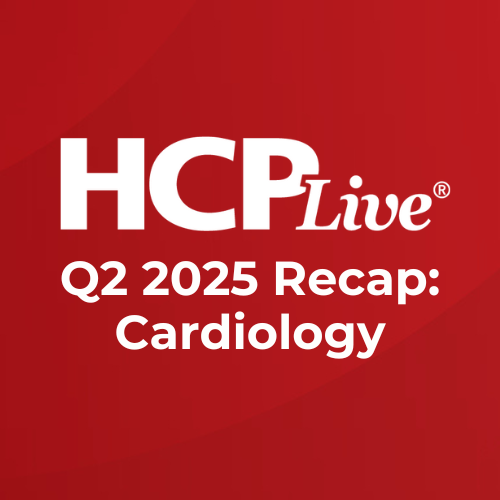HCPLive Cardiology
Q2 2025 Recap
The second quarter of 2025 brought a steady stream of momentum in cardiology, with developments spanning early-stage innovation, late-phase trial results, and new FDA approvals. This quarter’s recap includes 3 key regulatory milestones—including a major hypertension approval and a fast-tracked gene editing therapy—as well as 3 headline-making trial readouts that challenged, confirmed, or extended the evidence base in high-risk populations.
Rounding it out, Don’t Miss a Beat delivered 3 episodes from the frontlines of ACC, Heart in Diabetes, and beyond—offering expert commentary on treatment sequencing, cardiorenal strategies, and emerging approaches in ATTR-CM. Here’s a look at what mattered most this past quarter in cardiovascular care.
FDA News in Cardiology
FDA Grants Fast Track Designation to VERVE-102 Gene Therapy
On April 11, 2025, the FDA awarded Fast Track designation to Verve Therapeutics’ VERVE-102 gene editing medicine to lower low-density lipoprotein cholesterol (LDL-C) levels in individuals with hyperlipidemia and high cardiovascular risk. The regulatory agency cleared the Investigational New Drug (IND) application for VERVE-102 in March 2025, when the company provided interim data from the dose–escalation part of the Phase 1b Heart-2 trial.
FDA Accepts NDA Submission for Oral Semaglutide 25 mg
On May 2, 2025, Novo Nordisk announced the FDA accepted its NDA for a once-daily 25 mg oral formulation of semaglutide (Wegovy) for chronic weight management in adults with obesity or overweight. Based on Phase 3 OASIS 4 trial results, the pill showed significant efficacy in reducing weight in patients with at least one comorbidity. According to Novo Nordisk, this could become the first oral GLP-1 therapy approved for obesity treatment. The drug also aims to reduce cardiovascular risk in patients with established heart disease. The FDA decision is expected in Q4 2025.
FDA Approves Triple Combination Drug GMRx2 (Widaplik) for Hypertension Treatment
On June 9, 2025, the FDA approved GMRx2 (Widaplik), the first single-pill triple combination therapy—telmisartan, amlodipine, and indapamide—approved for initial treatment of hypertension in adults likely needing multiple drugs. Based on positive results from 2 phase 3 trials and the VERONICA study, Widaplik demonstrated superior blood pressure control and good tolerability. According to George Medicines, the pill’s design aligns with global guidelines recommending early use of combination therapy. A US launch is expected in Q4 2025.
Trial Updates
VERVE-102 Safely Cuts LDL-C Levels in Early Phase 1b Results
On April 14, 2025, Verve Therapeutics announced data from their phase 1b Heart-2 trial of VERVE-102 for the treatment of patients with heterozygous familial hypercholesterolemia (HeFH) and/or premature coronary artery disease (CAD). A single infusion of the in vivo gene editing medicine achieved dose-dependent reductions in blood PCSK9 and LDL-C, with a mean LDL-C reduction of ≥50% and a maximum decrease of nearly 70% at the highest dose.
Phase 3 Trial Results Announced for Sotatercept-csrk in Pulmonary Arterial Hypertension
On June 23, 2025, Merck announced positive topline results from the Phase 3 HYPERION trial, showing sotatercept-csrk (WINREVAIR) significantly reduced time to clinical worsening in newly diagnosed PAH patients at intermediate or high risk. Based on a composite primary endpoint, the trial met its goal, with additional benefits seen in walking distance, NT-proBNP levels, and functional class. According to Merck, these findings extend sotatercept’s evidence base to earlier-stage patients, building on prior success in advanced PAH. On July 02, 2025, Merck announced the FDA’s acceptance of their BLA for a label expansion, which was granted Priority Review.
ACHIEVE: Spironolactone Fails to Reduce Cardiovascular Risk in Dialysis Patients
On June 6, 2025, results from the ACHIEVE trial presented at ERA 2025 showed that spironolactone did not significantly reduce cardiovascular death or heart failure hospitalization in dialysis patients. Based on data from over 2,500 participants, the primary outcome occurred in 20.5% of the spironolactone group vs. 21.6% in the placebo group (HR 0.92; P = .35). According to investigators, the findings challenge earlier studies suggesting large cardioprotective benefits. Additionally, spironolactone was associated with a higher rate of severe hyperkalemia, occurring in 6.6% of patients.
Don’t Miss a Beat
During the second quarter of 2025, Don’t Miss a Beat released a trio of episodes, including a pair of in-person episodes from the floor at the American College of Cardiology and the Heart in Diabetes meeting. Check out our episode summaries below!
Treatment Sequencing in New Era of Heart Failure Management
In this episode recorded at ACC 2025, the hosts examine the expanding treatment landscape for HFpEF, advocating for early combination therapy using SGLT2 inhibitors, MRAs, and incretin-based drugs to improve outcomes. They debate rapid versus risk-based implementation, highlight phenotyping for tailored care, and discuss upcoming trials and the promise of fixed-dose combinations to enhance adherence.
CONFIDENCE Trial and Combination T2D, CKD Therapy at Heart in Diabetes 2025
In this episode, the hosts review findings from the CONFIDENCE trial showing that combination therapy with finerenone and empagliflozin significantly outperformed either drug alone in reducing albuminuria in patients with CKD and type 2 diabetes. They discuss the trial’s design, safety profile, and implications for rapid implementation strategies and future fixed-dose combination treatments in cardiorenal care.
Don’t Miss a Beat: Navigating the ATTR-CM Care Landscape, With Ahmad Masri, MD
In this episode, the hosts and their guest discuss major advances in treating transthyretin amyloid cardiomyopathy, highlighting FDA-approved agents like tafamidis, acoramidis, and vutrisiran, while examining challenges such as residual risk, late-stage symptom limitations, and lack of head-to-head data. They also explore future strategies including amyloid-clearing therapies and early intervention trials like ACT-EARLY, which could shift the focus toward prevention in high-risk patients.
